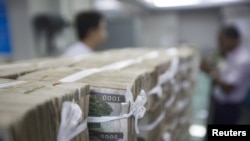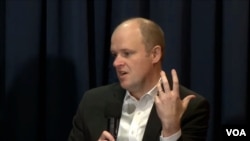"Digital currencies have played a pivotal role in backing Myanmar's Spring Revolution," following a military takeover of the government in February 2021, said NUG Deputy Minister of Planning, Finance and Investment Min Zayar Oo, in a statement to VOA.
The minister was appointed by the National Unity Government, or NUG, made up of members of Myanmar's former democratically elected government and other opponents of the junta.
Centralized digital currencies, however, can be a double-edged sword, with authoritarian regimes seeking to use them as a tool for financial surveillance and censorship.
"The primary advantage for pro-democracy activists lies in the fact that these currencies operate independently of government control, enabling individuals to offer support to their chosen recipients discreetly, without disclosing their identities," said Aung Paing, an expert on digital currencies and strategic partner engagement lead with the Independent Research Network (IRN).
The NUG introduced its own digital currency, the DMMK (Digital Myanmar Kyat), last year as a creative means to bypass banks controlled by the junta. According to a recent statement, the NUG is on the verge of establishing its own online bank, the Spring Development Bank, using digital currency and targeting NUG supporters and the Myanmar diaspora as customers.
The DMMK is tied to the value of the Myanmar kyat one-to-one, much like higher classes of cryptocurrencies, such as Tether (USDT), are tied to the value of the dollar. This class of cryptocurrency is known as "stablecoins."
DMMK is used both locally and internationally via a mobile wallet app, NUGPay. In June 2023, NUGPay released its first annual report stating that, one year after launch, total transactions in the app had reached over 300 billion kyats (nearly $150 million).
"The total amount in the DMMK system reflects that the cash flow is running well and that the number of NUGPay customers is growing," the report said; a statement reaffirmed by Min Zayar Oo several months after the report was released.
"Since the launch of DMMK, a total of over 600 billion kyat (nearly $300 million) has been circulated so far," he told VOA on Sunday.
Tool of liberation or oppression
While digital currencies are becoming a useful means for pro-democracy movements to circumvent controls by authoritarian regimes, they can also be an extremely useful tool for those regimes as well, according to Win Ko Ko Aung, Human Rights Fellow at Bitcoin Policy Institute. “Globally, tyrannies have used legacy financial systems to suppress activists and civilians,” Aung told VOA by phone.
"Central bank digital currencies, like the DMMK, have the potential to further empower authoritarian agendas," he added.
Privacy concerns have kept countries like the U.S. from adopting a centralized digital version of its currency, but countries like China have doubled down on its use of digital currencies to surveil individual transactions in an increasingly connected society.
"I think people underestimate exactly how much power financial surveillance can have over your life," said Chris Meserole, director of the Brookings Artificial Intelligence and Emerging Technology Initiative, at an event in Washington on September 27.
"They [authoritarian governments] can basically turn your house into a prison," he continued. "Because if you can't … go anywhere and transact in the world, they basically have … incarcerating power over everyone."
"The flip side … is that there is this tremendous capability and feature set of this technology," he said. "Whether it's bitcoin, or some of the other digital assets out there … it's fundamentally a messaging network that cannot be censored; and I think it's incumbent upon democratic regimes and institutions to try and safeguard that technology."
Grant McCarty, co-executive director of the Bitcoin Policy Institute, which co-organized the event, told VOA after the panel discussion that what cryptocurrencies like bitcoin are allowing people to do, "is actually evade some of these totalitarian powers that exist within authoritarian and anti-democratic regimes. If they want to send money to another country, if they want to send money to a pro-democracy group, they can do that. We've seen this in parts of Africa, we've seen this in Asia, around the world, people are using bitcoin to circumvent authoritarianism and totalitarian regimes and fight for freedom, fight for free speech and democracy in their country."
Bitcoin vs own currency
The question arises: why would the NUG adopt its own digital currency rather than using a more widely known cryptocurrency such as bitcoin, like they’re doing in Ukraine and other parts of the world struggling under similar circumstances? According to bitcoin expert, Win Ko Ko Aung, bitcoin is a better bet for those facing an authoritarian regime like the one in Myanmar.
"The bitcoin protocol runs on over 70,000 computers around the world, and not a single person or government controls that network. DMMK is a type of CBDC [Central Bank Digital Currencies], according to the definition. Whoever controls the money, controls the system. I understand the Myanmar exile government's ultimate goal in launching DMMK, but my concern is why they pegged the currency standard to the Myanmar kyat, which has been constantly dropping in value and being debased by the Myanmar military."
While bitcoin is an effective way to quickly transfer dollars, essential in a situation like the one in Ukraine, “Myanmar is different,” says Aung Paing, whose organization, the IRN, released a paper “Cryptocurrencies and the Spring Revolution.”
"Ukraine is seeking support from all over the world, and using bitcoin, yes, they can transfer money quickly and freely. However, bitcoin's value depends on supply and demand and can fluctuate wildly, so it's not a stable currency for the long term. It may be a good option for investors and others willing to accept that risk, but not for a government like the NUG, planning logistics for a revolution and supporting the people. The people of Myanmar want to be able to transfer money to buy property freely, safely, quickly and with a stable value. A central bank digital currency like the DMMK provides that type of stability," he said.
"It normally takes a lot of time to get people to accept a new currency," Paing continued. "However, when the DMMK came out during the Burma [Myanmar] Spring Revolution, the people immediately accepted and used the value as set by the NUG. In a time of upheaval and struggle, this digital currency has proven to be more than just a financial tool. It is a symbol of resilience, empowerment, and the unyielding spirit of those fighting for change."






